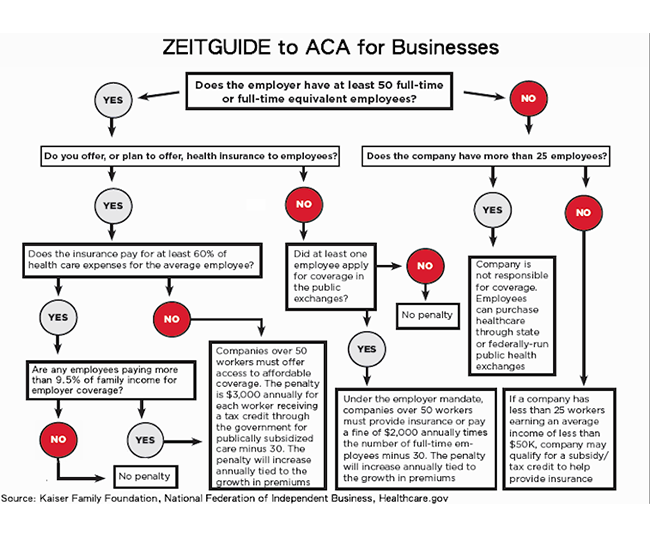ZEITGUIDE TO CULTURAL IMPLICATIONS OF AFFORDABLE CARE ACT

The final deadline to enroll in a health plan through the Affordable Care Act (ACA, aka Obamacare) came and went on Monday, and after a late surge, the administration reached its goal of 7 million people signing up. What does this mean?
The immediate result is that 7.1 million people have enrolled in the insurance provided by the Affordable Health Care Act. At the same time, those who don’t have insurance (through a job, private policy or as a dependant) will be penalized $95 or 1% of their salary come tax time. And the fees grow each year. The risks and rewards are even more confusing for employers: see decision tree that our team compiled for our clients above or here.
We discussed how the ACA was driving venture capital and startups to innovate around healthcare in ZEITGUIDE 2014.
This week, our friends at Learnvest, published an interview they did with me where I delve further into the macro-cultural impact the ACA is having on our finances, our well-being, and our businesses. I’ve included excerpts below, but I hope you’ll read the full interview here.
Keep Learning,
Brad Grossman
Founder, Grossman and Partners
Creator, ZEITGUIDE
Since the launch of HealthCare.gov this past fall, we’ve heard a ton of chatter about the Affordable Care Act (ACA)—everything from excitement and successes to controversy and glitches.
But once the dust settles and the final kinks are worked out, what will health care in America really look like?
To glean some insight, we reached out to Brad Grossman, founder and C.E.O. of Grossman & Partners and the creator of ZEITGUIDE. This cutting-edge guide showcases the year’s trends and provides predictions for the future, for topics from health care to science to movies to art.
Here, Grossman points to trends surrounding the Affordable Care Act to shed light on the future of health care—and how it will affect your wallet.
LearnVest: In the “Zeitguide,” you use the term “me-centered health care.” How is health care now being personalized?
Brad Grossman: As people have to shop for their own insurance, they will have to choose that [which is] most relevant to them.
Senator Bill Frist used a term the “grand medical inflection.” Described in his own words, it’s “consumer empowerment through portable devices—coupled with the parallel development of supercomputing.” For example, we are already seeing personalization, with individuals tracking their sleep and calorie expenditure with wearable devices like Fitbit, Up by Jawbone and Nike FuelBand.
There are also companies like HealthLoop that develop cloud-based technologies to help doctors automatically track patients between visits. Senator Frist may also be alluding to personal genetic data—emerging companies like 23andMe, which offers low-cost genetic analysis—which could help providers and patients make health decisions.
The guide discusses how the landscape is changing particularly for mental health care. What shifts will we see?
We have seen behavioral health become part of broader health care, especially since Patrick J. Kennedy’s Mental Health Parity Act, which required health insurers to provide equal coverage for mental and physical illnesses. But the White House also just recently pledged $100 million to increase access to care for people living with mental health and substance abuse disorders. Half of the amount will be made available through the ACA.
How will the ACA affect spending decisions?
Our “Zeitguide” friend Marshall Votta of Leverage Health Solutions taught us about a concept called “value over volume.” Traditionally, providers have been incentivized to maximize the volume of patients they see—not the value or the quality of care they give to their patients.
The “Zeitguide” mentions that start-ups have sprung up in the wake of the ACA. How will these new companies help consumers?
Perhaps the largest growths are in companies that are assisting consumers, providers and insurers to navigate the future of health care.
For example, start-ups like Gravie, Wellthie and Bloom Health are all companies that help employers and employees make sense of the exchanges. Evolent, Valence Health and Rise Health are in the business of helping providers advance value-based care delivery and innovative payment models. Healthloop has cloud-based technology that connects providers with patients and caregivers.
Another huge business opportunity: companies that are enabling direct-to-consumer health care, like Iora Health and White Glove Health, and concierge health services like MedLion, Paladina Health and One Medical.
Read the rest of the interview here.
Get ZEITGUIDE 2014 here for more on the how the Affordable Care Act will affect culture.
